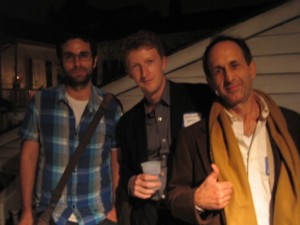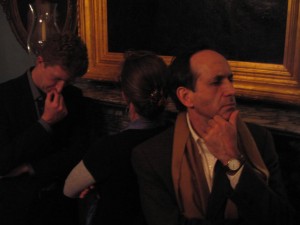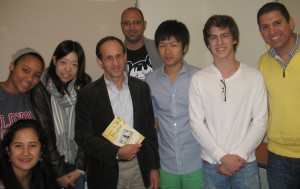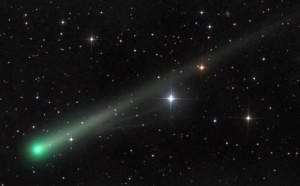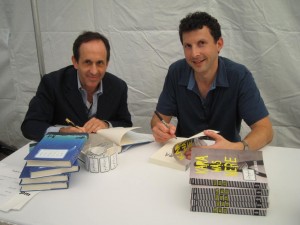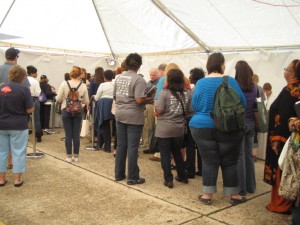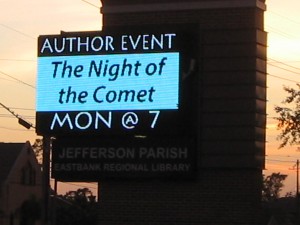I was recently interviewed for the New Orleans Review by Erin Little of Loyola University. Here it is. My only excuse is that I might’ve had a glass or two of wine before we spoke.

INTERVIEW by ERIN LITTLE
George Bishop: The Night of the Comet
Native Louisianan and Loyola alumnus (1983) George Bishop is emerging as a fresh and vibrant voice in the literary South. His previously successful novel Letter to My Daughter (Ballantine, 2010) showcased his ability to capture complex familial relationships in an inviting, though heart-wrenching way. Since then, Bishop has delved even further into the secret lives of families—prompting his characters to admit their shortcomings and disappointments, no matter how difficult that may be. In his second novel The Night of the Comet (Ballantine, 2013) cultural phenomena give way to harrowing realizations for a middle-class Louisiana family. The Night of the Comet soars with quiet truth and a clear-eyed vision.
INTERVIEWER
The Night of the Comet follows your previous successful novel, Letter to My Daughter. How was your creative process different in writing this new novel?
BISHOP
The first novel was comparatively easy because that novel was short in manuscript, only around 110 pages. In fact, I thought I was writing a novella. I had a very clear idea going into my first novel. I dreamed the whole novel before I wrote it, so I knew what the whole novel was about. I knew the voice and rhythm before I started writing. But for Night of the Comet, I didn’t have any of that going into it. I just had ideas. I knew I wanted to write about Comet Kohoutek and I also had recurring images in my head of a man in a raincoat leaping off a roof and a broken telescope. Then I had to build the novel from the ground up.
INTERVIEWER
The Night of the Comet plays out against the backdrop of small town Louisiana. Was it challenging or natural to write about a setting you are so familiar with? Did you find it rewarding?
BISHOP
I grew up in a small town too but it was north of here—Jackson, Louisiana. The small town in this novel is a bayou city. I wanted to set it there because it seemed more exotic to me. For me, to set it in this fictitious town called Terrebonne, I might as well have been setting it in Mongolia. It sounded that exotic to me. I wanted it to be a fictitious town so I wouldn’t be tied to the real geography or history of a city.
INTERVIEWER
What inspired you to choose Comet Kohoutek to aid you in telling this family’s story?
BISHOP
I barely remember Comet Kohoutek from when I was a kid. But I do remember all the excitement surrounding it. A couple of decades ago I made a note in one of my writing journals that I thought Comet Kohoutek could be a good backdrop for a story. But I didn’t know much about the Comet. When I began researching, I discovered interesting information about doomsday cults surrounding the comet and how big it really was then. I had no idea it was that much of an event in America at the time. But then it was a huge disappointment. It became like the laughing stock of comets after its big failure. In the world of astronomy, Kohoutek has become synonymous with huge failure. I thought I could hang the story on the timeline of the comet.
INTERVIEWER
Many readers have described The Night of the Comet as a coming of age story. How do you approach that label?
BISHOP
I don’t like that label. I don’t know who slapped that on the book because I wouldn’t call it a coming of age story. But I understand why it seems like that. I understand you have to label it as something. The fact that it’s told through the point-of-view of a fourteen-year-old kid who’s going through a sexual awakening perhaps makes it a coming of age story. But I was also thinking of it as the family’s story. I see it as a family story, really.
INTERVIEWER
What influenced your choice to set this story in the 1970’s?
BISHOP
The comet was coming in 1973. I had to set it at that time, but I didn’t want to make it a period piece. I didn’t want to make it a stereotypical 70’s piece so I really toned down the cultural references and time markers. I didn’t want it to be a book about the 70’s. I thought that would be too easy. I was also trying to avoid the clichés of Southern fiction. I wanted it to feel timeless.
INTERVIEWER
How did you develop narrator Alan Broussard Jr.’s original voice? What was challenging about adapting a perspective as youthful as his?
BISHOP
Limiting myself to Alan’s voice was the big challenge. It took awhile to come to this first person narrator because I kept trying to switch to third person. I settled on the first person narrator because I thought it felt more intimate and realistic. Once I settled on a fourteen-year-old narrator, I worked really hard to find the balance in his voice. I started out trying too hard to write as a fourteen-year-old. Later, the solution I found was to develop a sort of hybrid narrator—an adult looking back and telling the story. We do that when we tell stories about childhood. We use our vocabulary and understanding to explain how we saw things then. It’s a fourteen-year-old’s perceptions with an adult vocabulary.
INTERVIEWER
Alan Broussard Sr. has a pretty advanced knowledge of the cosmos. Was there heavy research involved in informing Alan Sr.’s perspective? Was the research enjoyable?
BISHOP
Oh yes, it was fun. Research is the fun part. Research is what you do when you can’t write.
INTERVIEWER
In the end, do the stars aid young Alan Broussard Jr. in better understanding his family and his own place in the world?
BISHOP
At the end of the novel, when Alan is an adult, he realizes his life is very small compared to the cosmos. But from the kid’s point of view, he can see his family being affected by the comet. Everyone’s going crazy because of the comet. And Alan gets caught up in it too. His parents and the whole town draw him into it. So I think Alan begins to feel like the comet is screwing up their lives completely. He feels that. He’s also a smart kid, though, so he’s resisting.
Erin Little is an intern for New Orleans Review and an English Writing major at Loyola University New Orleans.
